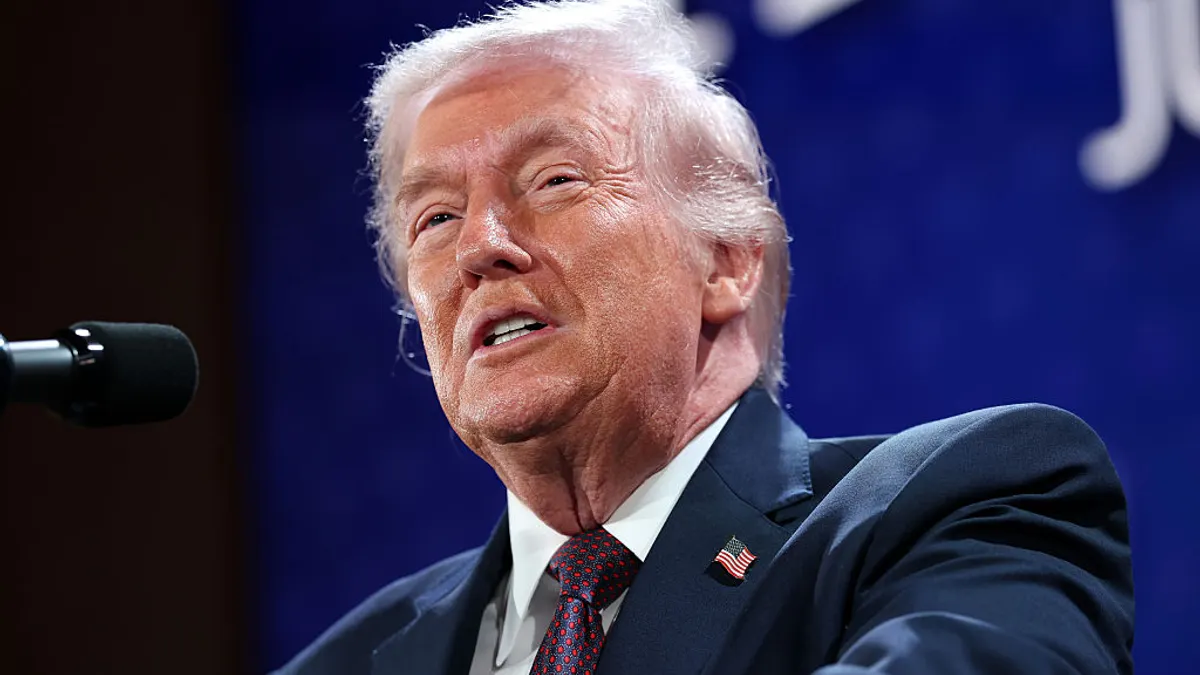Dive Brief:
- A pair of Pennsylvania lawmakers want to bar colleges that receive state funding from signing onto the Trump administration’s compact that would give institutions priority for federal research funding in exchange for sweeping policy changes.
- The two state lawmakers — Reps. Malcolm Kenyatta and Rick Krajewski, both of whom are Democrats — slammed the compact in an Oct. 3 legislative memo sharing plans for a forthcoming bill. Signing the agreement, they said, would “directly threaten the independence” of colleges.
- “The White House has indicated that more institutions may be able to join the compact in the future,” they wrote on Friday. “Through this legislation, we will be preserving academic freedom and independence in Pennsylvania and protecting students and staff who would otherwise be negatively impacted" by the proposed compact.
Dive Insight:
The Trump administration has asked nine research universities to sign the compact, which promises greater access to federal funding if they adopt certain policies governing admissions, hiring and academics.
For instance, colleges that sign the compact would agree to cap their share of international students to 15% of undergraduate enrollment, commit to using “lawful force” to respond to protests disrupting classroom instruction or traditional study spaces, and decline to comment on societal or political issues that don’t directly impact their operations.
The University of Pennsylvania was one of the nine institutions asked to sign the compact. J. Larry Jameson, president of the Ivy League institution, said in a public statement Sunday that he would seek input on the compact from the campus community, including Penn's trustees and faculty senate.
On Friday, Krajewski and a Philadelphia councilmember demanded Jameson reject the compact. “This is not a peace offering, this is a hostile takeover,” they said in a statement.
Although Penn is a private nonprofit, it does receive some state funding. Last fiscal year, state lawmakers appropriated nearly $32 million for the university’s School of Veterinary Medicine and almost $1.8 million to its medical school's Division of Infectious Diseases.
“We are glad Penn hasn't yet agreed to sign onto this compact and we are eager to work with them as partners,” Krajewski said in a Tuesday email. “With an endowment of more than $23 billion, we believe they can be a leader among universities advocating for workers and research impacted by federal cuts.”
Kenyatta seconded those comments, adding, “Bullies do not stop bullying you once you roll over. I would hope by now institutions would recognize that.”
Penn officials did not immediately respond to a request for comment about the forthcoming legislative proposal.
The university has already cut a deal with the second Trump administration. In March, federal officials suspended $175 million of the institution’s research funding over its prior policies allowing transgender women to compete in women’s sports. The following month, the U.S. Department of Education’s Office for Civil Rights determined that Penn's policies had violated Title IX, which prohibits sex-based discrimination at federally funded institutions.
To resolve the allegations, the university agreed to adhere to the Trump administration’s interpretation of Title IX and to give titles to cisgender women on its swimming team that had been previously awarded to transgender women.
California Gov. Gavin Newsom has forcefully responded to the Trump administration’s compact proposal, vowing to cut off state funding to colleges that sign onto the agreement. The University of Southern California, a private nonprofit, was among those invited to sign the compact.
The Trump administration gave the nine universities until Oct. 20 to respond to the compact. The other seven universities asked to sign the agreement are: the University of Arizona, Brown University, Dartmouth College, Massachusetts Institute of Technology, the University of Texas at Austin, Vanderbilt University and the University of Virginia.















